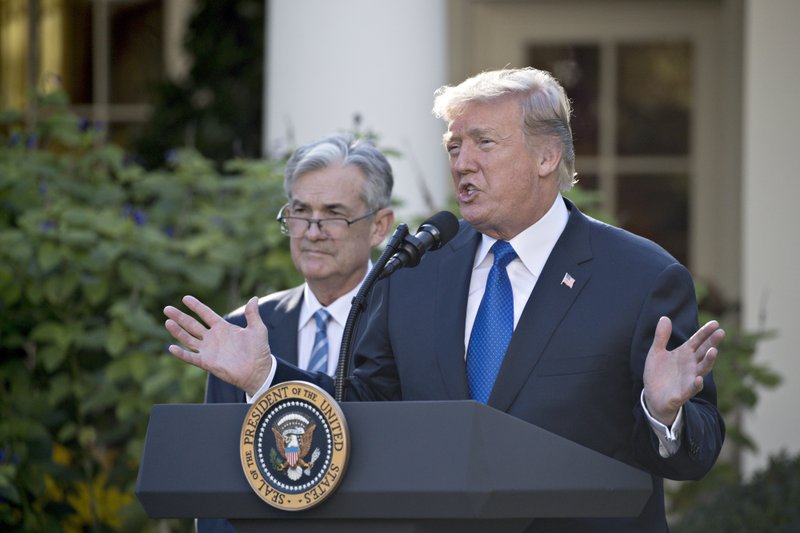WASHINGTON -- President Donald Trump on Monday urged the Federal Reserve not to raise interest rates, but Fed officials are widely expected to do so this week despite the president's ongoing public effort to dissuade the U.S. central bank from putting any brakes on the economy.
"It is incredible that with a very strong dollar and virtually no inflation, the outside world blowing up around us, Paris is burning and China way down, the Fed is even considering yet another interest rate hike. Take the Victory!" Trump wrote Monday in a Twitter post.
Fed officials will conclude a two-day meeting on Wednesday, and Wall Street traders predict the Fed will raise rates by a quarter-point, setting them at a range of 2.25 percent to 2.5 percent. Such an increase would keep rates low by historical standards but put them at the highest level in a decade.
The president's repeated attempts to dissuade the Fed mark a break with his predecessors, who generally avoided commenting publicly on the central bank's policies to protect its credibility and independence.
Interest rate increases are meant to check inflation, but they can also slow the economy, adding another challenge to Trump's efforts to deliver on his promises of booming growth.
While the U.S. economy looks strong right now, there are signs of a potential slowdown. The Dow Jones industrial average is on track to end 2018 in the red, erasing one of the president's top talking points: that the market has thrived during his tenure. The housing market has also been weak. And business investment, which bounced earlier this year, dried up in the third quarter.
Still, the Fed is worried about the economy overheating. It says small, gradual interest rate increases are the best way to tap the brakes a bit to ensure inflation doesn't rise too quickly and bubbles don't form.
Unemployment remains at an almost 50-year low and economic growth is expect to be around 3 percent this year, well above the 2 percent that the Fed thinks is normal for the U.S. economy. Wages are growing at their fastest pace in a decade in nominal terms, a sign that more inflation could be coming.
Investors and the White House will be watching carefully Wednesday for what the Fed and Chairman Jerome Powell indicate is likely to happen in 2019. The Fed had predicted three more rate increases next year, but many economists now think that is too many, especially with many experts predicting the U.S. economy will start slowing next year and could end up in a recession by 2020.
"Our gradual pace of raising interest rates has been an exercise in balancing risks. We know that moving too fast would risk shortening the expansion. We also know that moving too slowly -- keeping interest rates too low for too long -- could risk other distortions in the form of higher inflation or destabilizing financial imbalances," Powell said Nov. 28.
Powell caused the stock market to rally that day when he said he thought the Fed had taken rates to "just below" the so-called neutral rate of interest, which is a level that doesn't stimulate or contract growth. The Fed is widely expected to stop increasing rates once it hits the neutral rate.
The expectation for this week is that the Fed will revise its predictions for next year down to two rate increases and that Powell will try to signal in his statement that the Fed will be "data dependent" and more open to changing course as needed.
"We see the December [Fed] meeting producing a dovish hike, where the Fed further affirms a shift to a nimble regime, while also shifting its projected hiking path and economic projections downward," the economics team for BNP Paribas wrote in a note to clients.
In recent months, Trump has lashed out at the Fed and its leaders, calling the central bank "loco" and "out of control" and saying he is "not even a little bit happy" with Powell, whom Trump appointed to the top job just more than a year ago after he decided not to reappoint then-Chairman Janet Yellen, who was known to be cautious about rate increases.
In recent days, Trump has tried to take a slightly softer tone, including his tweet encouraging the Fed leaders to "Take the victory!" And last week, Trump told Reuters that Powell is a "good man" who is "trying to do what he thinks is best," one of the more complimentary statements he's made about the Fed chairman in recent months.
Fed officials continue to deny that Trump's tweets and criticisms are having any effect on monetary policy.
"I just don't think of it," said Mary Daly, president of the San Francisco Fed, in an appearance last week on PBS NewsHour. "The great thing about the Fed is we have been given independence. There are no politics at the Fed."
The central bank's Federal Open Market Committee, the body that sets interest rate policy, will announce its decision Wednesday afternoon. Powell will speak at a news conference afterward.
Business on 12/18/2018

